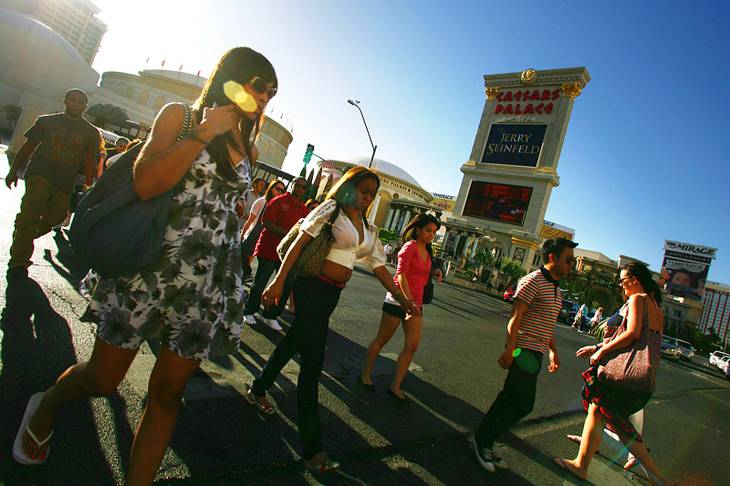Business has finally picked up on the Las Vegas Strip for Caesars Entertainment Corp., which Tuesday reported a smaller first quarter loss.
The company lost $147.5 million in the quarter ended March 31 vs. the $195.6 million lost in the same quarter of 2010.
Net revenue of $2.179 billion was down 0.4 percent due to reduced visitation by rated players eligible for comps as well as the temporary closures of four properties in Illinois and Indiana due to weather conditions and flooding.
The numbers nationwide were affected by an initiative at Caesars to reduce comps and marketing spending on lower-spending gamblers.
Las Vegas, which has been hit hard by the recession since 2008, produced better numbers in the quarter for Caesars in line with improvements reported by competitors MGM Resorts International, Las Vegas Sands Corp. and Wynn Resorts Ltd.
Caesars said Las Vegas visitation by rated players rose 8.7 percent and spending per rated-player trip increased 1 percent.
Hotel revenue in Las Vegas jumped 17.4 percent thanks to the acquisition of Planet Hollywood, and as the average daily room rates increased 7.6 percent, the occupancy percentage rose 4.4 percentage points.
The daily rate and occupancy percentages were not disclosed.
Net revenue in Las Vegas totaled $726.4 million, up 6.4 percent. EBITDA in Las Vegas – a profitability measure – rose 1.3 percent to $193.4 million. EBITDA means earnings before interest, taxes, depreciation and amortization.
The Las Vegas properties are Bally’s, Bill’s Gamblin’ Hall, Caesars Palace, Flamingo, Harrah’s, Imperial Palace, Paris, Planet Hollywood and Rio.
Despite concerns about high gasoline prices affecting travel to Las Vegas, Chief Financial Officer Jonathan Halkyard said during a conference call with analysts, "We feel good about the way business is building for the balance of the year."
CEO Gary Loveman said if gas prices affect visitation to Caesars properties around the country, the affect would mainly be for low-spending customers the company isn’t marketing to much anyway.
"We are certainly not enthusiastic about higher gas prices. We don’t know much about what this looks like after $4 per gallon -- $4 was near the high-water mark the last time we went through this in 2008. But so far, so good," Loveman said.
Loveman was asked during the conference call whether Caesars is reconsidering its policy of not charging hotel customers resort fees, which have spread throughout Las Vegas.
Loveman said Caesars is sticking with the no-fee policy.
"We’re quite happy with this strategy. This is a strategy much like you’ve observed Southwest do in the airline industry. It requires some time to take root," Loveman said. "We want to distinguish our value proposition against competitors in a customer-friendly way. As people check out at our facility and see they have not been hit with this fee and check out at our competitor's facility and see that they have, they will take that into consideration on their next visit."
Elsewhere in Nevada, Caesars’ properties in Laughlin, Reno and Lake Tahoe saw net revenue fall 3.9 percent to $105.6 million and EBITDA decline 3.2 percent to $18.1 million. These properties were hurt by both reduced visitation and reduced spending by visitors.
Even as Caesars has reduced spending on comps for lower-yielding gamblers, it has beefed up its Total Rewards player loyalty program with the launch of Total Rewards Marketplace.
"This exciting development initiative expands our reach into the online world by allowing Total Rewards members to earn points through purchases they make at their favorite retailers online. Retailers will provide customers with special promotions and discounts exclusive to Total Rewards members," Loveman said.
"The marketplace will have participation from hundreds of online merchants," he said.
Companies participating so far include Target, Apple, Avon, Barnes & Noble, Best Buy, Foot Locker, Gap, Starbucks, wine.com and 1-800 Flowers.
Loveman, a longtime advocate of legalized online gaming, added that the recent indictments of poker companies by a federal grand jury in New York shows Internet poker should be legalized by Congress.
"We believe strongly that the recent federal indictments of illegal online poker operators should convince Congress to allow American citizens to play online poker and to allow American companies to compete in a multi-billion-dollar industry," Loveman said. "By acting now to legalize a game enjoyed by millions of adult citizens, Congress can clarify ambiguous federal laws, generate tax revenues for federal and state governments and bring thousands of jobs to this country."
"Until the recent indictments of three foreign companies, millions of Americans were regularly playing poker online, sending millions of dollars and thousands of jobs to companies offshore," he said. "Despite the indictments, other unregulated offshore companies have already stepped in to capture the business once dominated by the indicted entities.
"Much like we observed in prohibition, attempts to ban Americans from playing poker online have clearly failed," Loveman said.
